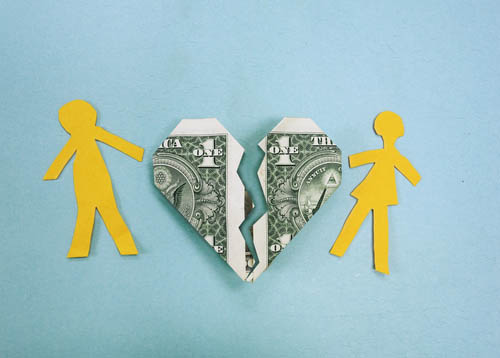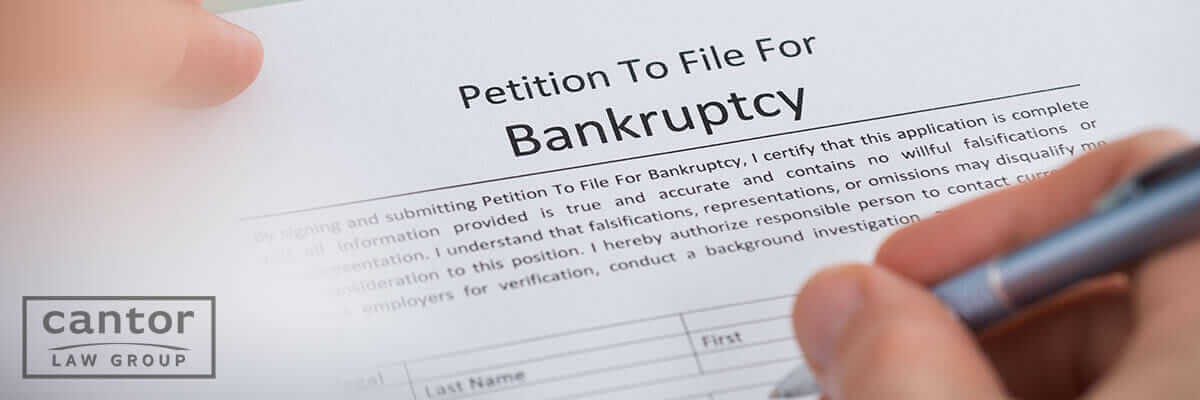Bankruptcy during divorce, money and financial issues are the top cause of arguments between spouses. According to a 2018 survey that was conducted by Ramsey Solutions. Financial stress is also the second leading cause of divorce after infidelity. These statistics show that there is little wonder that many couples who plan to divorce in Arizona may also be in financial situations that necessitate filing for bankruptcy.
If you want to file for divorce and also want to file for bankruptcy, the timing is important. When you are trying to figure out whether to file before your divorce or legal separation, at the same time as you are divorcing, or following your divorce, there are several things that the experienced attorneys at Cantor Law Group thing that you should consider.
Filing for Bankruptcy Before Your Divorce: Pros and Cons
There are several ways that filing for bankruptcy before your divorce can benefit you. If you file for bankruptcy first, you and your spouse will only have to pay one filing fee and can share the legal fees of your bankruptcy attorney. Filing for bankruptcy first can also make the property division portion of your divorce case simpler. In a normal divorce, or divorce with children the court will divide both the assets and the debts. If you and your spouse secure a discharge of your unsecured debts, neither one of you will have to pay them after you receive the discharge. This means that the court will not need to divide them.
It is also important to note that if a judge orders your spouse to pay a debt that you share, the court’s order will not impact the creditor. Since the creditor is not a party to your divorce, it can go after either you or your spouse to collect payment. If you do not obtain a discharge of a debt through bankruptcy, the creditor can seek to collect what is owed regardless of the family court’s orders. If it is discharged in a bankruptcy that you and your spouse file before you file for divorce, the creditor may not engage in any further collection activities for that debt against either you or your spouse.
Chapter 13 bankruptcy
Filing for bankruptcy before your divorce also has a few disadvantages. If you plan to file for Chapter 13 bankruptcy instead of for Chapter 7 bankruptcy, it may be a better idea for you to wait to file your bankruptcy case until after your divorce is finalized. This is because of the differences between these two types of bankruptcy.
Chapter 7 bankruptcy
A Chapter 7 bankruptcy is also called liquidation bankruptcy. In Chapter 7 bankruptcy, your non-exempt assets will be liquidated to repay a portion of what you owe to your creditors. In many cases, most of the assets that are owned by a debtor are exempt, meaning that you may lose few assets in a Chapter 7 bankruptcy. Chapter 7 bankruptcy cases last just a few months and can rid you and your spouse of your obligation to repay unsecured debts. You must be able to meet the means test to file this type of bankruptcy, however.
By contrast, a Chapter 13 bankruptcy is a type of bankruptcy that involves you entering into a repayment agreement that will last between three and five years. If you and your spouse file for Chapter 13 bankruptcy before your divorce. t will be a long time before your shared repayment plan is completed. Unless you and your spouse are very amicable, it might not be a good idea for you to file this type of bankruptcy before you divorce.
Filing for Bankruptcy and for Divorce at the Same Time

It is generally never a good idea to file for bankruptcy during a divorce for multiple reasons. This is because both your divorce and bankruptcy cases will impact each other, causing the cases to be delayed. When you file for bankruptcy, your non-exempt assets will become a part of your bankruptcy estate. This means that the judge in your divorce case will not be able to divide your assets until your bankruptcy case is concluded. If you also have alimony and child support issues in your divorce, they can slow down your bankruptcy case. It is best to file either bankruptcy or divorce first instead of filing them at the same time.
Filing for Bankruptcy After Your Divorce: Pros and Cons
Some people choose to file for divorce first and then to file for bankruptcy after their divorces have been finalized. This might be advantageous if you either plan to file for Chapter 13 so that you can retain more of your property or if you don’t qualify to file for Chapter 7 bankruptcy because your income is too high. However, if you and your spouse both need to file for bankruptcy, waiting until after your divorce is final means that you will each have to pay your own filing fee for your bankruptcy petitions, which means that you will ultimately pay more in legal fees. aban
Bankruptcy After Divorce
Waiting until after your divorce to file for bankruptcy protection may also be beneficial if you and your spouse cannot get along. If your divorce is filled with conflict, it may be best to wait until the divorce is final before you file for bankruptcy. This can allow you to seek a discharge of your debts without having to depend on your spouse working together with you in your bankruptcy case.
Another potential benefit of waiting to file for bankruptcy until after your divorce is over occurs when the combined income of you and your spouse is too high for you to qualify to file for Chapter 7 bankruptcy and to obtain a faster discharge of your debts. If your separate incomes will allow you to qualify under the means test for Chapter 7, you and your spouse might want to wait until after your divorce is over to file for bankruptcy so that you can both obtain quick discharges of your unsecured debts after your divorce is finalized.
Unsecured debt payment
One issue that can arise when an ex-spouse files for bankruptcy after a divorce is the division of debts that was previously ordered by the family court in the dissolution case. If the bankrupt spouse was ordered to pay a joint debt in the divorce case and subsequently obtains a discharge of that debt, the debt does not simply disappear.
If your ex-spouse was ordered to pay an unsecured debt such as a credit card or medical bill that is in both of your names and subsequently has it discharged in bankruptcy, the creditor will not be allowed to try to collect on the debt from your ex-spouse.
However, the discharge that your spouse obtained will have no impact on the ability of the creditor to come after you to collect on the debt. You also will not be able to enforce the family court’s order to your ex-spouse to repay that debt because the bankruptcy court’s order for the discharge supersedes the family court’s order.
Contact Cantor Law Group
If you need to file for bankruptcy and divorce, it is important for you to talk to a divorce lawyer as well as a bankruptcy attorney before you file for either one. An attorney can review your circumstances and help you to determine which case you should file first. It is generally not a good idea to file both at the same time. Whether you file for bankruptcy before or after your divorce will depend on your financial circumstances and whether you and your spouse will be able to work together through the bankruptcy process. To learn more, call Cantor Law Group at 602.254.8880, or request a free consultation by filling out our online contact form.


